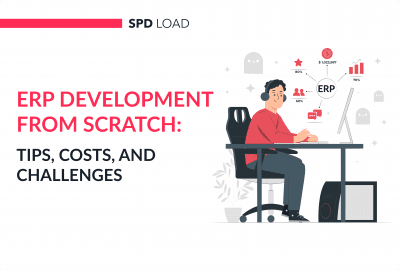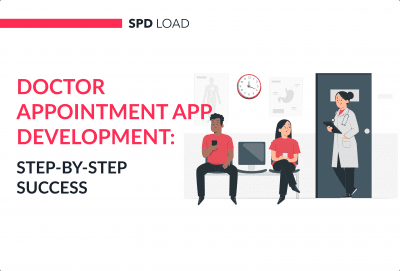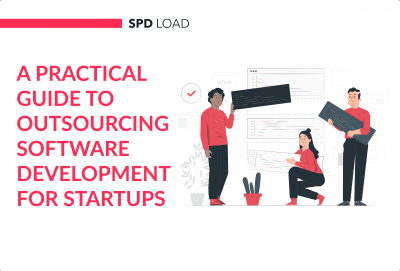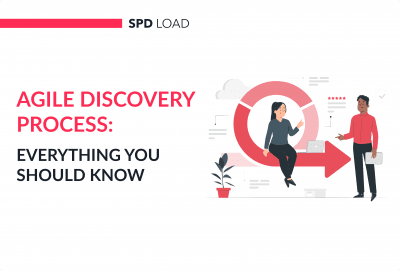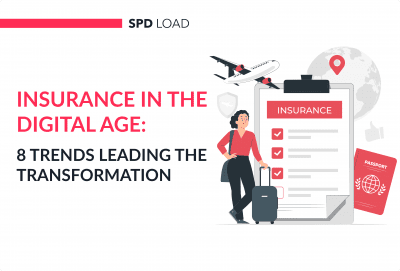SaaS vs ASP: Key Differences Explained
- Updated: Nov 12, 2024
- 5 min
What’s the difference between Software as a Service (SaaS) and an Application Service Provider (ASP)? These two tech models sound alike but work differently.
In this blog, we explain what sets SaaS and ASP apart. Key differences include:
- How the software is delivered
- Who manages the app
- How customers pay
Understanding these distinctions is helpful whether you are building apps or using them. Our guide breaks it down in simple terms.
We’ll define what SaaS and ASP do, discuss the pros and cons, and help you decide which approach suits your needs. No tech background is required!
Unlock your business's full potential with our tailored SaaS solutions—start transforming your ideas into reality today!
What is SaaS?
SaaS is a term that means the software as a service. This model may seem to be rather complex to understand out of hand, not to mention to be often confused with ASP.
Thus, we will try to explain SaaS to you in plain language.
SaaS is a business model that doesn’t require to buy the hardware for your application.
You don’t need a license. You pay to a provider and get the software via the internet. The provider bears responsibility for maintaining and upgrading your software.
Why SaaS?
While today’s cloud technology is already on the rise, let’s take a look at cloud predictions for 2025.
The research showed that customers will choose private cloud infrastructure and focus on deploying hardware at the edge.
With the rise of cloud usage, the use of cloud workload protection platforms (CWPP) and similar solutions to secure workloads from attacks is becoming more of a necessity for companies using a multi-cloud strategy.
And that’s where effective SaaS management comes in.
According to the predictions, the days when we had time to try and get insights into SaaS have long passed. Our goal now is to use this model to its full extent to be able to catch up with the new flow. 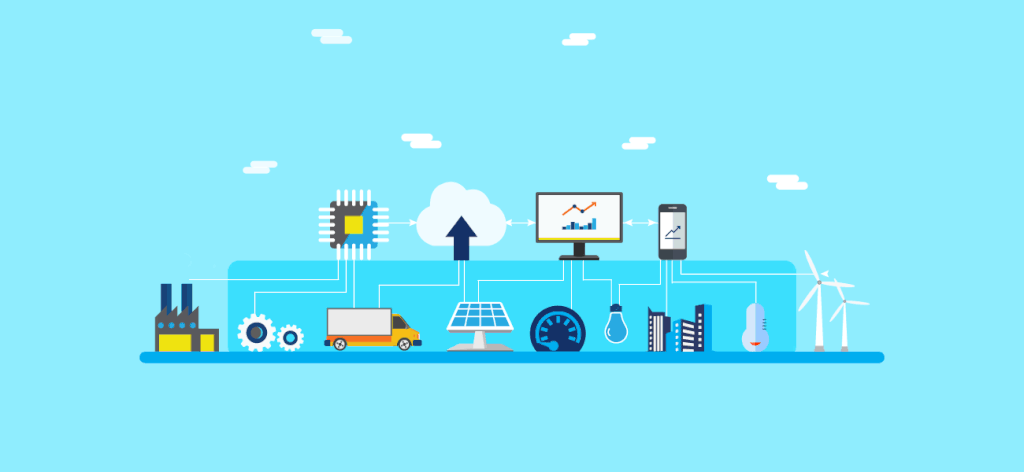
What is ASP Model?
Application Service Providers (ASP) is a desktop as a service provider. It uses for accessing applications. They located on a remote from the consumer server, via the Internet or a private network.
Applications are usually hosted by a third party. Often they not associated with the software vendor itself. The person who places the software may not have enough experience in the field of software.
This can lead to low efficiency and slow response to problems. Support and upgrade require extra costs.
Currently, several types of ASP can be distinguished:
- Enterprise ASP works with large companies and enterprises. It renting complex high-tech solutions for them. Typically, the service includes individual configuration and full maintenance of the selected applications. Sometimes, the ASP takes on the training of enterprise employees to work with leased applications.
- Local/regional providers. Specialization of regional ASP – work with small companies in a small geographical region. As a rule, a set of the most common simple office applications is available for rent.
- Providers of specialized solutions (Specialist ASP). These companies provide access to applications that solve specific problems. Tor example, problems within a narrow sphere of professional activity or business. This can be user feedback, automation of personnel management, or rental of a Web server.
- Providers of complex solutions (Volume business ASP). Provide rental of pre-formed packages of services and applications. They uses to solve the main set of tasks in a specific market. The main area of activity is the complex service of small enterprises.
- Providers for operation and maintenance of finished business processes (Business process outsourcers (BPO)). Specialize in performing certain functions in business processes. For example, on customer service or delivery of goods.
- Providers of commercial networks (Commerce network providers). A business serving commercial networks for performing electronic data between companies. For example in the B2B leads area.
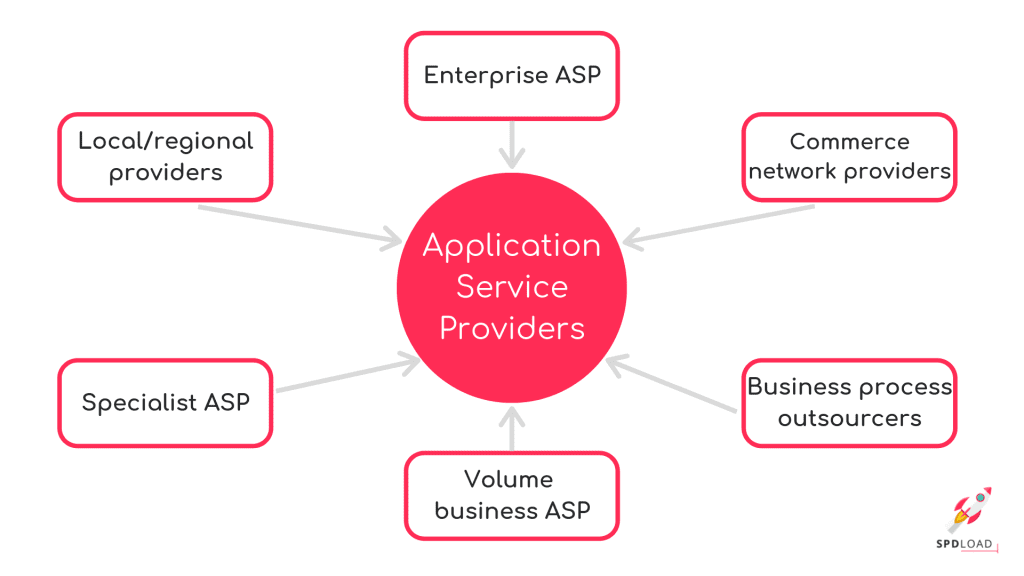
The applications they offer can be categorized as the following:
- Personal applications. Include application packages similar to Microsoft Office, games and educational software products; See how you can make a difference in learning with these EdTech startup ideas.
- Means of communication and interaction – e-mail, applications for conferences, etc .;
- e-Commerce applications. Used in working with buyers and suppliers of the company. For example, electronic stores;
- CRM-, ERP-applications;
- vertical-specific applications for specific industries;
- analytical – financial analysis, analysis of customer demand, risks, etc.
Why ASP?
The ASP model can be advantageous for small and medium-sized businesses. It allows them to get specialized software by outsourcing their main IT needs( check out our IT outsourcing for small business article to learn more) ASP doesn’t require the distribution of the software. However, it provides constant technical support, security, and maintenance of up-to-date services. Moreover, ASP promotes the flexible working of the software.
ASP Model vs SaaS Model
The key difference between SaaS and ASP is the accession. By the SaaS model, the customer buys access to a few business functions, not to the application at all.
What about the framework of the ASP model? In this case, a customer receives a dedicated installation of software. This is deployed on the remote site and not having several owners.
The SaaS model offers various multi-tenancy benefits. Multi-tenancy here also means that every customer that uses the software is provided with the same version of it. Every customer gets the same upgrades and features for free, as a guaranteed benefit of subscription service. The SaaS model is scalable and eliminates the main difficulties with the customization process. For the vendor, the SaaS multi-tenancy will minimize the overall costs on operation and sales cycles, providing efficient resource utilization. The SaaS model allows for improving customer service and strategy.
Explore our SaaS services today
ASP doesn’t provide multi-tenancy. However, the ASP model may be used by the vendor, who is looking for a simpler model for business and doesn’t want to spend time on re-architecting the product. Another difference is that the term ASP can mean not only business applications but also service or infrastructure software. 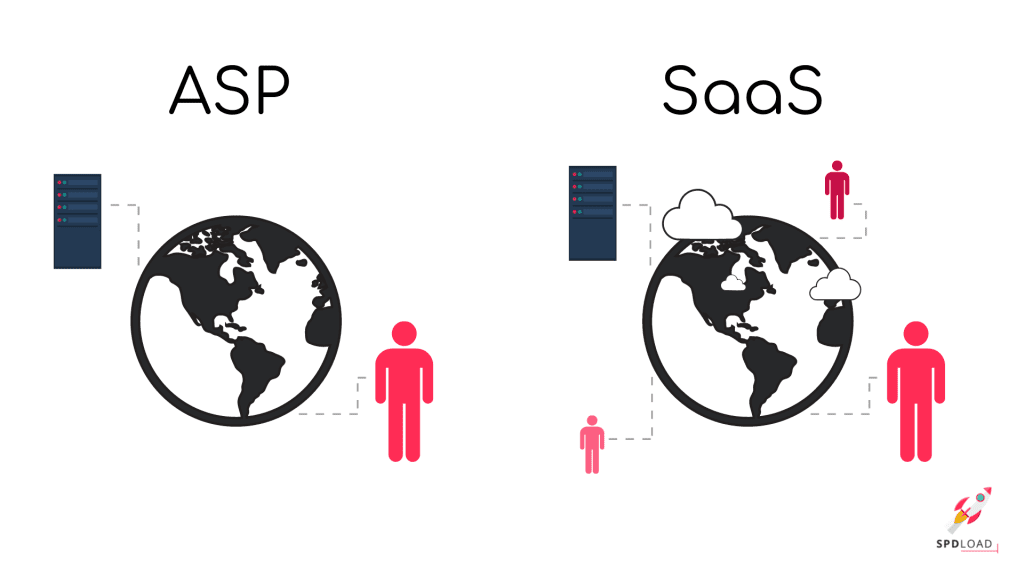
ASP vs SaaS: Pros and Cons
| ASP | SaaS |
| Single-tenant approach | Multi-tenant approach |
| Personalized solution for each user | Same features and range of capabilities to all users |
| The user has power on the solution hosted by the vendor and can demand the kind of service needed | The provider manages, maintains and supports the solution. User cannot claim any specific changes |
| User data could be hosted at any jurisdiction per user’s requirement | User data is hosted at a jurisdiction that the provider chooses |
| Cost is based on the user’s requirements | Compared to ASP, cost is lower |
| User has an ability to buy the software from a third-party retailer and host it somewhere else | User is not able to buy the software from a third-party retailer and is limited to the SaaS vendor always |
| It may take a lot of time to customize | The service is available right after signing up |
| The usage of the solution may be difficult. It may be caused due to the necessity of customized training and orientation for each user | All users have the same manual making it easy to use |
| ASP is not necessarily internet-based | SaaS is always internet-based |
| Upgrades and enhancement are infrequent | Upgrades and enhancement are conducted quite often |
Sometimes it is said that SaaS – this is the same ASP, but named differently for marketing reasons.
However, as we can see, the difference between these two models is quite significant.
That’s why this opinion can hardly be accepted.
Check out our insights on custom software development cost that cover what drives prices and how to manage expenses.
Conclusion
There you have it – the key differences between SaaS and ASP models summarized. When selecting your tech stack, consider scalability, flexibility, cost, security, uptime, and customization needs.
If you want to build a custom solution specifically for your needs, let’s connect. Whether SaaS, ASP, or a custom platform, we architect and build software crafted specifically for you.





